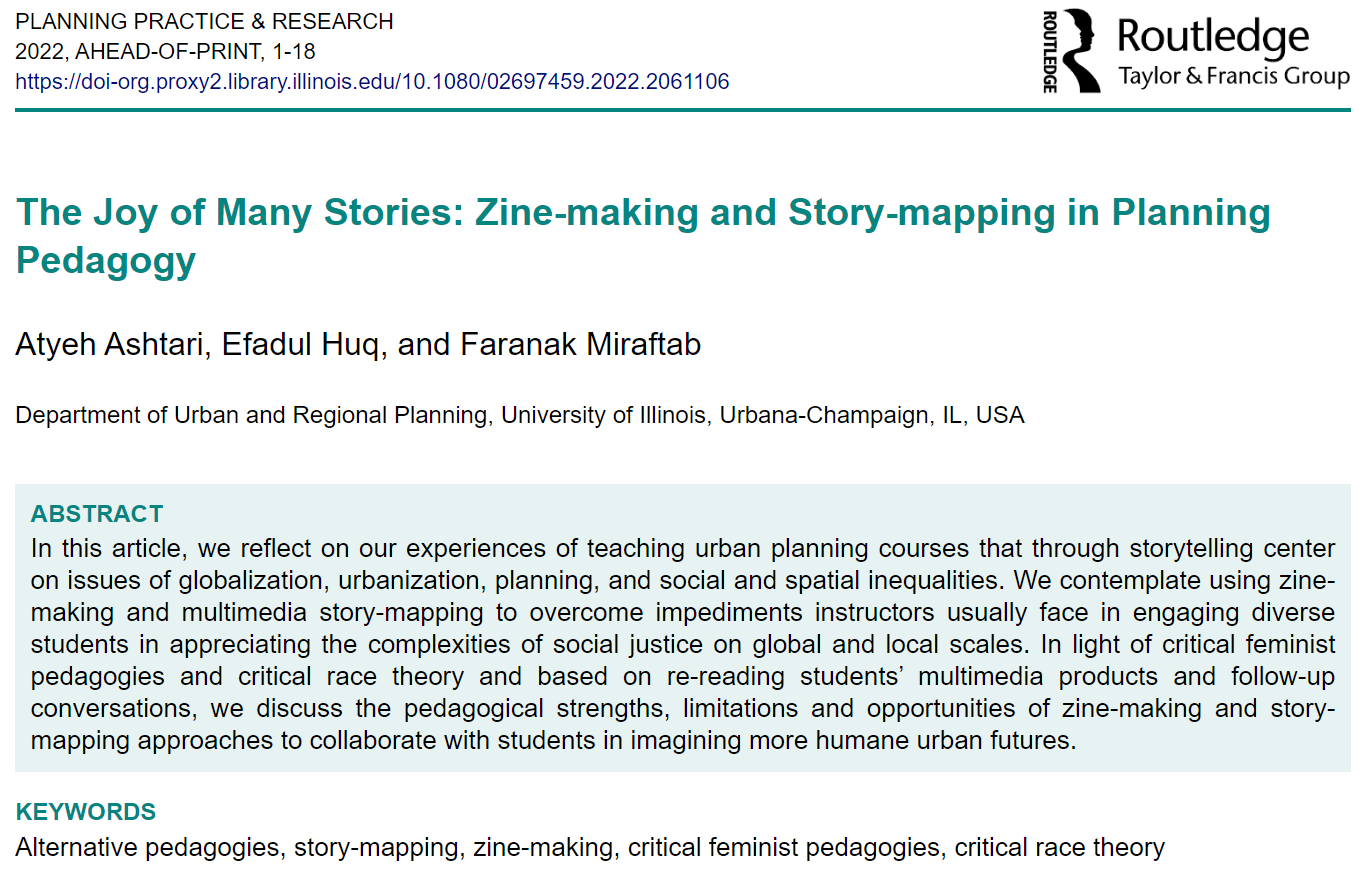Teaching
Teaching Philosophy
I am deeply influenced by and draw from the rich insights and frameworks of Critical Race Theory (CRT) and Critical Feminist Pedagogies (CFP) in sculpting my pedagogical strategies. In my co-authored (first author) article, The Joy of Many Stories: Zine-making and Story-mapping in Planning Pedagogy, we have formulated five co-constructive principles stemming from CRT & CFP running through our pedagogical strategies:
(1) moving beyond individualistic approaches and valuing collectivity and co-ownership;
(2) acknowledging diverse forms of knowledge and knowledge productions;
(3) emphasis on the importance of narratives and counter-narratives;
(4) recognizing whole human beings, affective relations and lived experiences as students and instructors;
(5) practicing an ethical responsibility and advocating for culturally, socially and politically engaged teaching and research.
Planning education requires that students be prepared to tackle complexities of social and spatial justice that play out along multiple lines of difference such as class, race, gender, ability, sexuality, age, religion and nationality that materialize uniquely in specific places. As educators, we need to imagine pedagogic variations beyond the conventional forms of teaching to connect classrooms with the world beyond.
Often, the answer to lack of pedagogical diversity is limited to changing the course content. But how we teach is as important as what we teach. We need to innovate teaching approaches that connect with the surrounding communities and bring alternative knowledge production and dissemination practices into the classroom. I envision my classrooms as spaces for engaged pedagogy where we ‘educate as the practice of freedom’ and where we imagine students and teachers as ‘co-travelers’ who grapple together with questions through reading, writing, making, seeing, listening, telling and retelling as they learn with maps, films, songs, activists, poets and human beings.
Teaching Expertise and Recognitions
I offer extensive and engaging pedagogical experience and expertise from multiple courses and workshops I taught, online and in-person, to graduates, undergraduates and NGOs. In my capacity as both Instructor and Teaching Assistant, I designed courses that incorporate digital and art-based storytelling methods (such as multi-media story-mapping, game design, videos, podcast, etc.), participatory research, and active learning tools. I have been placed on the university-wide List of Teachers Ranked as Excellent by Students multiple times for teaching both undergraduate and graduate courses. For my service work bridging campus and community as well as my efforts toward increasing inclusion and diversity, I have been granted the 2022 Outstanding Graduate Social Justice Award offered to one graduate student across campus annually by the office of Diversity and Social Justice Education at UIUC. You could learn more about my teaching experience by watching the video above featuring me as one of the leading instructors for a multi-disciplinary campus-wide design competition/course in 2017 at UIUC.
Teaching Experience
Doctoral Level
UAPP 8012: Collaborative Urban Problem Solving
Graduate Level
PLAN 7610: Digital Storytelling for Humane Urbanism
PLAN 7008: Site Design and Digital Visualization
PLAN 7008: Site Planning
UP 501: Planning History and Theory
UP 494: Digital Storytelling (co-designed syllabus with Professor Faranak Miraftab)
HORT 301: Plant Identification in Woody Landscapes
LA 281: Design Communications & Visualization in Landscape Architecture II
Undergraduate Level
UP 185: Cities in a Global Perspective
UP 101: Introduction to Urban and Regional Planning
Sesquicentennial Design Competition (8 week campus-wide multi-disciplinary workshop with 18 different majors in 8 groups)
Design Studio III
Professional Workshops for Non-for-profits
How to Use Theory of Change for Community-based Development Projects
K-12 Education
English as a second language
*For detailed information + a list of other teaching experiences as guest lecturer on various topics, Please, refer to my CV.



